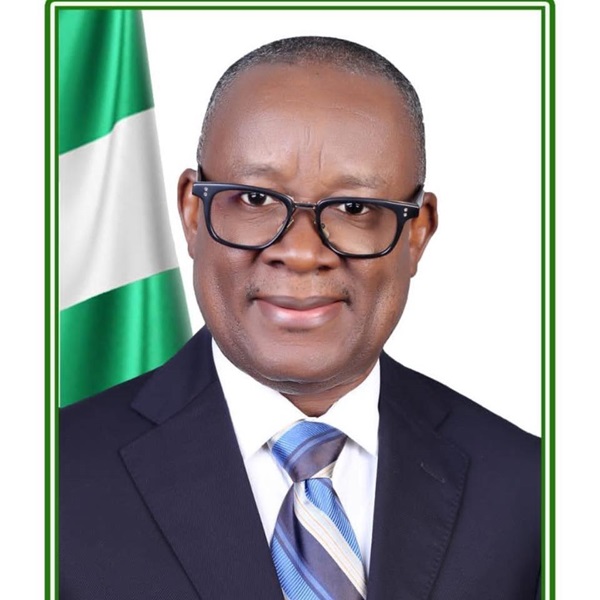
The Minister of State for Industry, Trade, and Investment, Sen. John Enoh, has called for collaboration between the government and the organized private sector (OPS) to build a more robust industrialised nation.
The minister made this appeal during a town hall meeting organised by OPS in Lagos. The meeting focused on addressing the persistent challenges hampering the growth of Nigeria’s industrial sector.
In his remarks, Enoh emphasised the critical role of the manufacturing sector in driving economic progress. He pointed out that no country can transition from a developing to a developed economy without revitalising its industrial base. Stressing the importance of synergy among stakeholders, the minister underscored the need for sustainable development in Nigeria’s manufacturing industry.
The minister identified collaboration, accountability, and transparency as pivotal elements of what he termed a “movement for a better nation.” He advocated for inter-ministerial cooperation to achieve national goals, highlighting the involvement of the Raw Materials Research and Development Council (RMRDC), under the Federal Ministry of Innovation, Science and Technology, as essential. According to him, the council plays a significant role in Nigeria’s industrialisation process.
Enoh proposed the establishment of an industrial revolution work group comprising stakeholders from the Federal Ministry of Industry, Trade & Investment (FMITI), the Ministry of Solid Minerals, the Ministry of Agriculture, the RMRDC and members of the OPS. The OPS includes the Manufacturers Association of Nigeria (MAN), the Nigerian Association of Small and Medium Enterprises (NASME), the Nigeria Employers’ Consultative Association (NECA) and the Nigerian Association of Small-Scale Industrialists.
He stated that the work group, which he would chair alongside the director-general of MAN as co-chair, would meet quarterly to assess progress and address challenges facing the manufacturing sector. The aim would be to develop actionable solutions and drive the industrialisation agenda forward.
In his goodwill message, the director-general of the RMRDC, congratulated the minister on his appointment and praised his commitment to industrial growth despite prevailing challenges. The DG commended the minister’s initiatives to steer the nation toward self-reliance and economic independence.
Ike-Muonso highlighted the RMRDC’s contributions to advancing the manufacturing sector. One notable initiative is the sponsorship of the Raw Material Protection Bill, currently under review by the National Assembly. The bill aims to mandate 30 per cent value addition to indigenous raw materials before export. According to the DG, this legislation will protect Nigeria’s natural resources and enhance domestic processing capabilities, thus easing the challenges faced by local manufacturers.
The DG also mentioned the launch of the Raw Materials Information System (RMIS), a central database designed to monitor material flows and support industrial planning. This platform offers comprehensive data on deposits, distribution, location, quality, quantity and security of raw materials. He added, “The RMIS will enable comprehensive tracking and management of raw materials, fostering strategic industrial development.”
During the meeting, the chairman of OPS and President of MAN, Otunba Francis Meshioye, along with MAN’s director-general, Mr. Segun Ajayi-Kadir provided an overview of the industrial sector. They addressed both the challenges and prospects of the manufacturing industry.
Mr. Ajayi-Kadir revealed that the manufacturing sector accounts for 46.5 per cent of Nigeria’s industrial output, making it the leading contributor to the sector. He stressed the transformative potential of manufacturing in economic development, stating that prioritizing the sector could generate at least $6.72 billion in foreign exchange and contribute over 80 per cent of non-oil exports.
Despite challenges, he noted that Nigeria’s industrial value in 2023 was $118.22 billion, ranking second in Africa, with the manufacturing sector contributing $55.74 billion.
Ajayi-Kadir outlined several recommendations to revitalize the manufacturing sector. These include:
- Passing the Fiscal Policy and Tax Reform Bill currently before the National Assembly.
- Enforcing compliance with standards for imported goods to protect local manufacturers.
- Providing government support for innovation in local production processes.
- Scaling up raw materials development and utilisation efforts.
The OPS chairman emphasised the urgency of implementing these measures to create a more enabling environment for manufacturers and drive sustainable economic growth.
The meeting concluded with stakeholders expressing optimism about the potential for collaborative efforts to transform Nigeria’s industrial sector into a global economic force.


